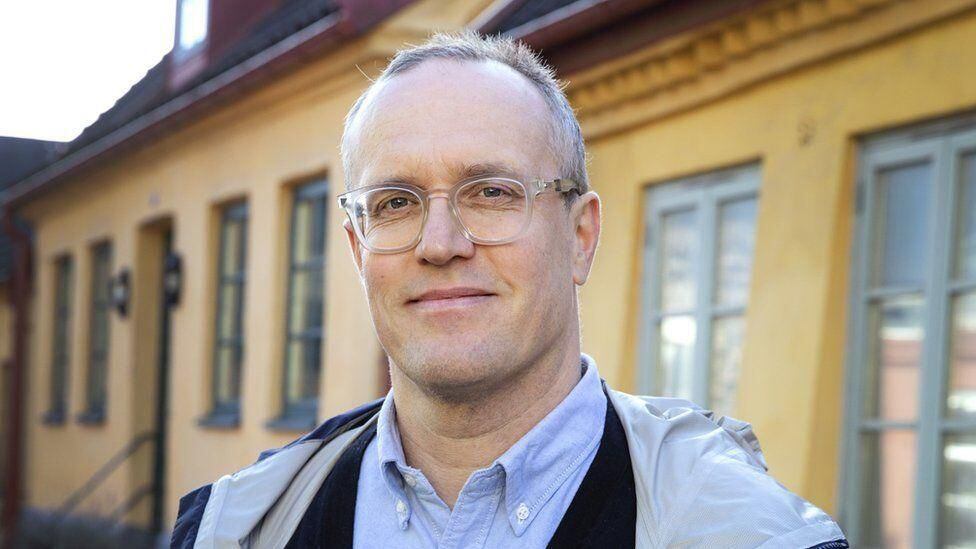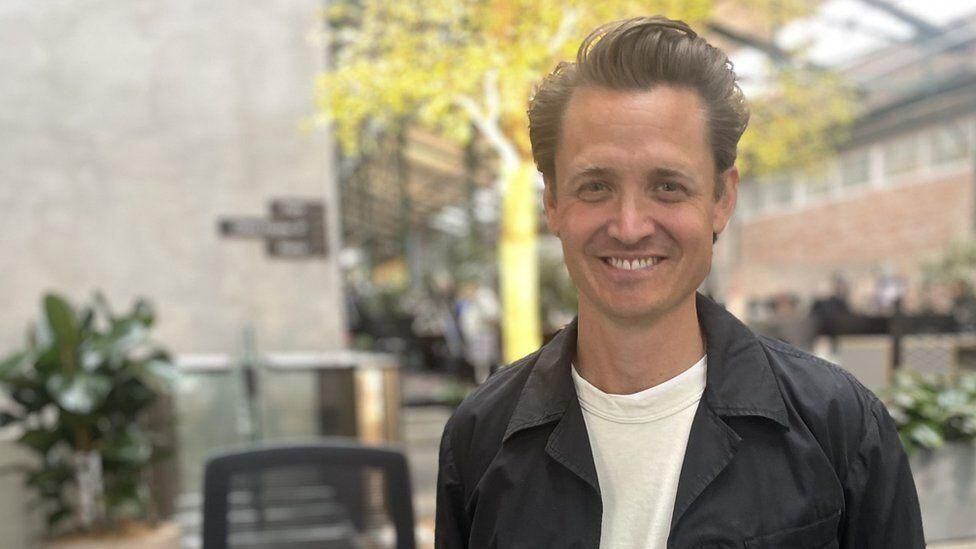Sweden It has a global reputation for championing high taxes and social equality, but it has also become Europe’s hotspot for the super-rich.
On the island of Lidingö There are huge red and yellow wooden villas atop rocky cliffs and minimalist white mansions with floor-to-ceiling windows.
SEE: How Trem Aragua, the first transnational organized crime gang to operate in the country, expanded its power in Chile
Located less than half an hour’s drive from Stockholm city center, this is one of the wealthiest neighborhoods in Sweden.
When the entrepreneur Konrad Bergstrom He turns on the light switch in his cellar and the 3,000 bottles he stored there appear.
“French Bordeaux, that’s what I love”he says, showing off his shiny white teeth.
Additionally, there’s an outdoor pool, a gym lined with reindeer skin, and a workshop-turned-nightclub, complete with a huge metal urinal.
“I have a lot of musician friends, so we play a lot,” he explains. Bergström.
He made money by co-founding companies, including a headphone and speaker company.and this house is one of four properties he owns in Sweden and Spain.
It’s not a surprising lifestyle for a successful entrepreneur, but what may surprise observers around the world is how many people have become just as rich. Bergström -or even richer- in Sweden, a country with a global reputation for its left-wing politics.
Although a right-wing coalition is currently in power, for most of the last century, governments led by social democrats, elected on the promise of growing the economy equitably, have led the nation. with taxes that finance a strong welfare state.
But Sweden has seen a boom in the super-rich over the past three decades.
In 1996, there were just 28 people with a net worth of a billion kronor or more (about $91 million at current exchange rates), according to a rich list published by the former Swedish business magazine Veckans Affärer.
Most of them came from wealthy families for generations.
In 2021, there were 542 “crown billionaires”, according to a similar analysis by the newspaper Aftonbladet, and among them they had wealth equivalent to 70% of the country’s GDP, a measure of the total value of goods and services in the economy.
Sweden, with a population of just 10 million, It also has one of the highest proportions of “billionaires” per capita in the world.
Forbes included 43 Swedes worth $1 billion or more on its 2024 richest list.
This equates to about four per million people, compared to about two per million in the United States (which has 813 billionaires – the most of any nation – but is home to more than 342 million people).
“It happened in such a stealthy way that you only realize it after it happened,” says Andreas Cervenka, a journalist at Aftonbladet and author of the book “Greedy Sweden,” in which he explores the steady rise of the Swedish superregion. rich. .
“But in Stockholm you can see the wealth with your own eyes and the contrast between the super-rich people in some areas of Stockholm and the quite poor people in other parts.”

The unicorns
One of the reasons for the rise of the new super rich is Sweden’s thriving tech scene.
The country has a reputation as the Silicon Valley of Europe, having produced more than 40 startups called unicorns (companies worth more than a billion dollars) in the last two decades.
Skype and Spotify were founded here, as were gaming companies King and Mojang.
The latest global success stories include fintech startup Tink, which Visa acquired for around $2 billion during the pandemic, healthcare company Kry and electric scooter company Voi.
At Epicenter, a communal shared office space with a giant glass atrium, veteran entrepreneur Ola Ahlvarsson attributes this success to the 1990s.
Says a tax break on home computers in Sweden “It connected all of us to the Internet much faster than in other countries.”
Ahlvarsson, who has also co-founded several companies, points to a strong “culture of collaboration” in the startup scene, with talented entrepreneurs often becoming role models – and investors – in the next generation of technology companies.
Sweden’s size also makes it a popular test market. “If you want to see if it works in a larger market, you can try things here, at a limited cost and without much risk to your brand or your share price,” says Ahlvarsson.
But Cervenka argues that there is another narrative that deserves more attention: the monetary policies that he says have helped transform the country into a paradise for the super-rich.
Sweden had very low interest rates from the beginning of 2010 until a few years ago.
This made borrowing money cheap, so Swedes with money to spare often chose to invest in property or high-risk investments such as technology startups, many of which soared in value as a result.
“One of the big factors driving this huge increase in billionaires is that we have had, for several years, quite strong inflation in asset values,” says Cervenka.
Although in Sweden people with higher incomes pay more than 50% of their personal contributions (one of the highest rates in Europe), the journalist maintains that successive governments (right and left) They adjusted some taxes in a way that favors the rich.
The country eliminated wealth and inheritance taxes in the 2000s, and tax rates on money made from stocks and shareholder payments are much lower than payroll taxes.
The corporate tax rate has also fallen from around 30% in the 1990s to around 20%, slightly below the European average.
“You don’t need to leave Sweden if you are a billionaire today. And in fact, some billionaires are moving here“Yes,” says Cervenka.
“No private jets or anything like that”
Back on the island of Lidingö, Konrad Bergström agrees that Sweden has “a very favorable tax system for construction companies”.
However, he says his wealth has a positive impact because his businesses – and his homes – provide employment for others.
“We have a nanny, a gardener and a cleaning crew… and that also creates more jobs. So we shouldn’t forget how we are building society.”
Bergström notes that wealthy Swedish entrepreneurs and venture capitalists are also increasingly reinvesting in so-called “impact” ventures, which focus on improving society or the environment.
By 2023, 74% of all venture capital funding will go to startups Swedish companies targeted impact companies.
This is the highest percentage in the EU and well above the European average of 35%, according to data from Dealroom, which compiles data on startups.
Perhaps the country’s most prominent impact investor is Niklas Adelberth, co-founder of unicorn payments platform Klarna.
In 2017, he used $130 million of his fortune to launch the Norrsken Foundation, an organization that supports and invests in impact companies.
“I don’t have the habits of billionaires in terms of owning a yacht or a private jet or something like that,” Adelberth says. “This is my recipe for happiness.”

But others argue that Sweden lacks a nuanced public debate about multimillion-dollar wealth, beyond a dichotomy between good and evil about how businesspeople spend their fortunes.
Recent research from Örebro University concluded that the media image of Swedish billionaires is predominantly positive and suggested that their fortunes They are rarely explained in the context of changes in the country’s economic policies.
“As long as the super-rich are seen as embodying the ideals of the neoliberal era, such as hard work, risk-taking and an entrepreneurial attitude, the inequality behind this will not be questioned,” says media researcher Axel Vikström.
Cervenka adds that debates about taxing the super-rich are not as pronounced in Sweden as they are in many other Western countries, such as the United States.
“It’s something of a paradox. You would think that, given our background, being seen as a socialist country would be the most important thing,” says the author.
“I think it has to do with [el hecho] that we have acquired a “winner takes all” mentality.
“So if you play your cards right, you can also become a billionaire… And I think that’s a pretty significant change in the Swedish mentality.”
Sweden’s rich list also reveals that the country’s wealth remains largely concentrated in the hands of white mendespite the country’s large immigrant population and decades of policies that defend gender equality.
“Yes, it’s where people can create new money, create new wealth, but it’s still very closed and the double standards are quite high in terms of who funds the ideas,” says Lola Akinmade, a Nigerian-Swedish novelist and entrepreneur.
“Sweden is an incredible country that is a leader in many ways, but there are still many people excluded from the system.”
Source: Elcomercio
I am Jack Morton and I work in 24 News Recorder. I mostly cover world news and I have also authored 24 news recorder. I find this work highly interesting and it allows me to keep up with current events happening around the world.

:quality(75)/cloudfront-us-east-1.images.arcpublishing.com/elcomercio/GLF677HZKFFJHKLW3MMQKZI3QE.jpg)



:quality(75)/cloudfront-us-east-1.images.arcpublishing.com/elcomercio/AM3K5NXFCVAFHOCGBUUS6P7BJE.jpg)
:quality(75)/cloudfront-us-east-1.images.arcpublishing.com/elcomercio/NZLPS5WAS5HTTJMXO7RURJRS6E.jpg)
